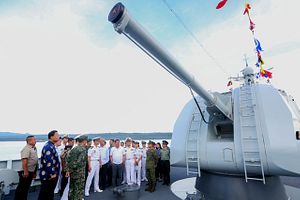In early January, news broke that a local subsidiary of South Korean shipbuilding giant Hanjin Heavy Industries and Construction (HHIC) had defaulted on loans from local banks. While the immediate focus on this was on the issues of debt and lost jobs resulting from what is the largest corporate default in Philippine history, it has also raised questions about whether it could provide the opportunity for a takeover by Chinese companies. That possibility ties into wider concerns about national security implications that extend across the Indo-Pacific and increased scrutiny on the China policy currently adopted by President Rodrigo Duterte.
As I have been noting in these pages and elsewhere, Duterte’s warming of ties with China — in spite of Manila’s ongoing disputes with Beijing in the South China Sea — has increased scrutiny on the implications of greater Sino-Philippine engagement in some areas in recent years. Over the past few years, we have seen fierce debates in the Philippines around various issues, from a potential energy agreement with Beijing in the South China Sea to a deal that could increase Chinese state-owned firm involvement in the telecommunication sector in the Philippines.
Last month, another major issue in the China-Philippine relationship emerged with the suggestion that the country’s largest shipyard in the Subic Bay Freeport Zone, the site of an American naval base during the Cold War since turned into an economic zone, could be taken over by Chinese companies. The fear has been that unless the Philippine government intervenes in some way in the case of the local unit of HHIC, a Chinese takeover could give Beijing a strategic foothold in the Southeast Asian state.
It is hard to understate the significance of this issue. For one thing, what is at this point the biggest corporate default in Philippine history has put at risk the jobs of thousands of Philippine workers and deepened concerns about shipbuilding in the country in the middle of a midterm election year for Duterte. For another, this has triggered a wider debate within the Philippines about the national security implications of certain Chinese investments in the country and put additional scrutiny on Duterte’s approach of warming relations with Beijing even as Manila is in the midst of contentious disputes with it on the South China Sea. Beyond the Philippines itself, the issue has generated interest amid rising concerns about China’s attempts to strengthen its foothold in key strategic ports and dual use facilities in the wider Indo-Pacific, which has been in the headlines over the past few years with cases including Djibouti, Sri Lanka, Malaysia, and Vanuatu.
The path ahead on this issue is far from certain at this point. For all the focus on China, there are shipbuilders from other Asian and Western countries that could also take over from HHIC, depending on the exact financial terms that would be at play. Philippine defense officials, including Defense Secretary Delfin Lorenzana, have indicated that some form of takeover by the government in concert with private entities is possible, and that Duterte is receptive to the idea. But assessing the feasibility of this as an actual, sustainable solution will depend on the specifics. Even as this issue, like others of its ilk, has been cast in primarily geopolitical terms, it is worth remembering that the actual crisis itself was precipitated by economic challenges faced by HHIC and the shipbuilding industry more generally, and those will need to be addressed to not just get past the current crisis, but prevent future ones as well.
What this means for the broader China-Philippine relationship also remains to be seen. The issue has proved to be the latest lightning rod in stimulating a conversation about how to address the national security implications of Chinese investments in certain industries, which is much needed not only in the Philippines but in other countries in the Indo-Pacific as well. But thus far at least, while other prominent figures in the Philippines have been rightly pointing out this wider issue, we have not seen the Duterte administration move to facilitate such a wider debate. Instead, the sense at this point is that we are more likely to see a quick patching up of this issue and a continuation of China-Philippine engagement given its strategic significance for Duterte himself.
Irrespective of the uncertainties that remain, the Duterte administration’s China policy and growing scrutiny on Beijing’s activities in the Philippines means we are likely to see more of such concerns emerge on various fronts in the remaining years of Duterte’s single, six-year term. How those concerns will be important to watch as they have important implications not only for the Philippines, but the region more broadly.
































